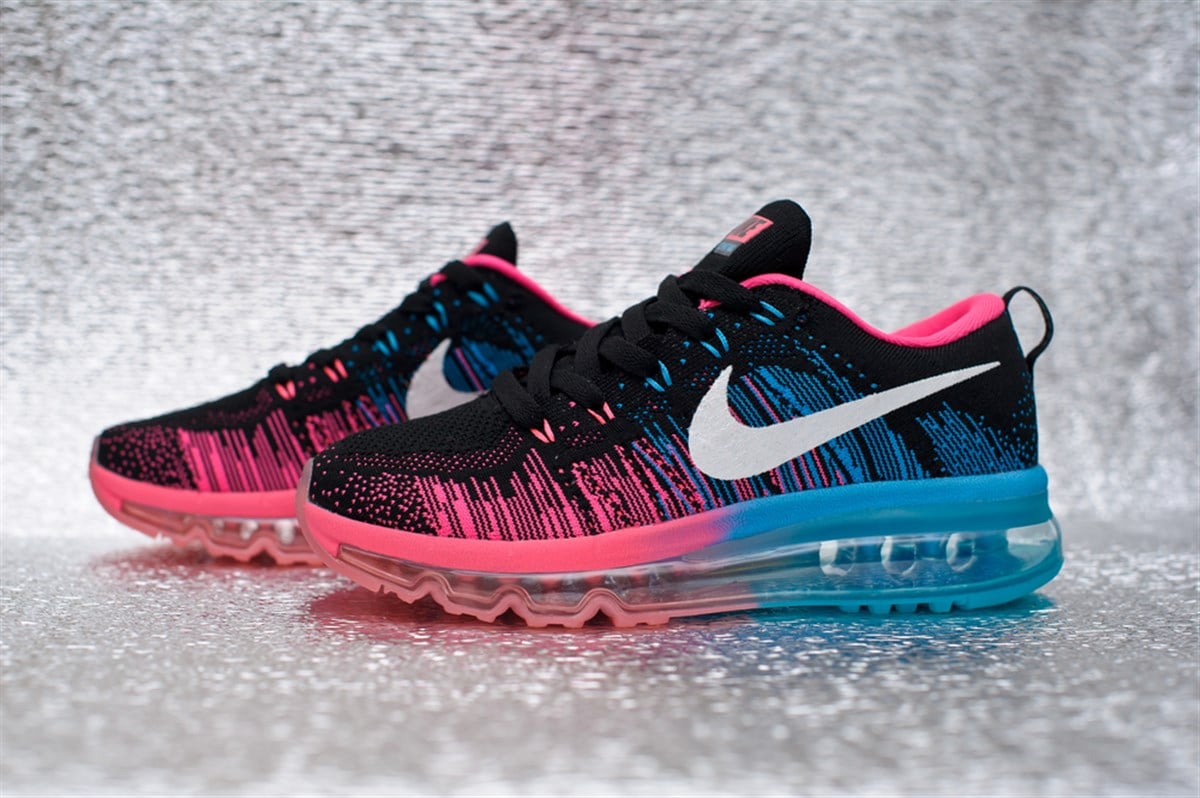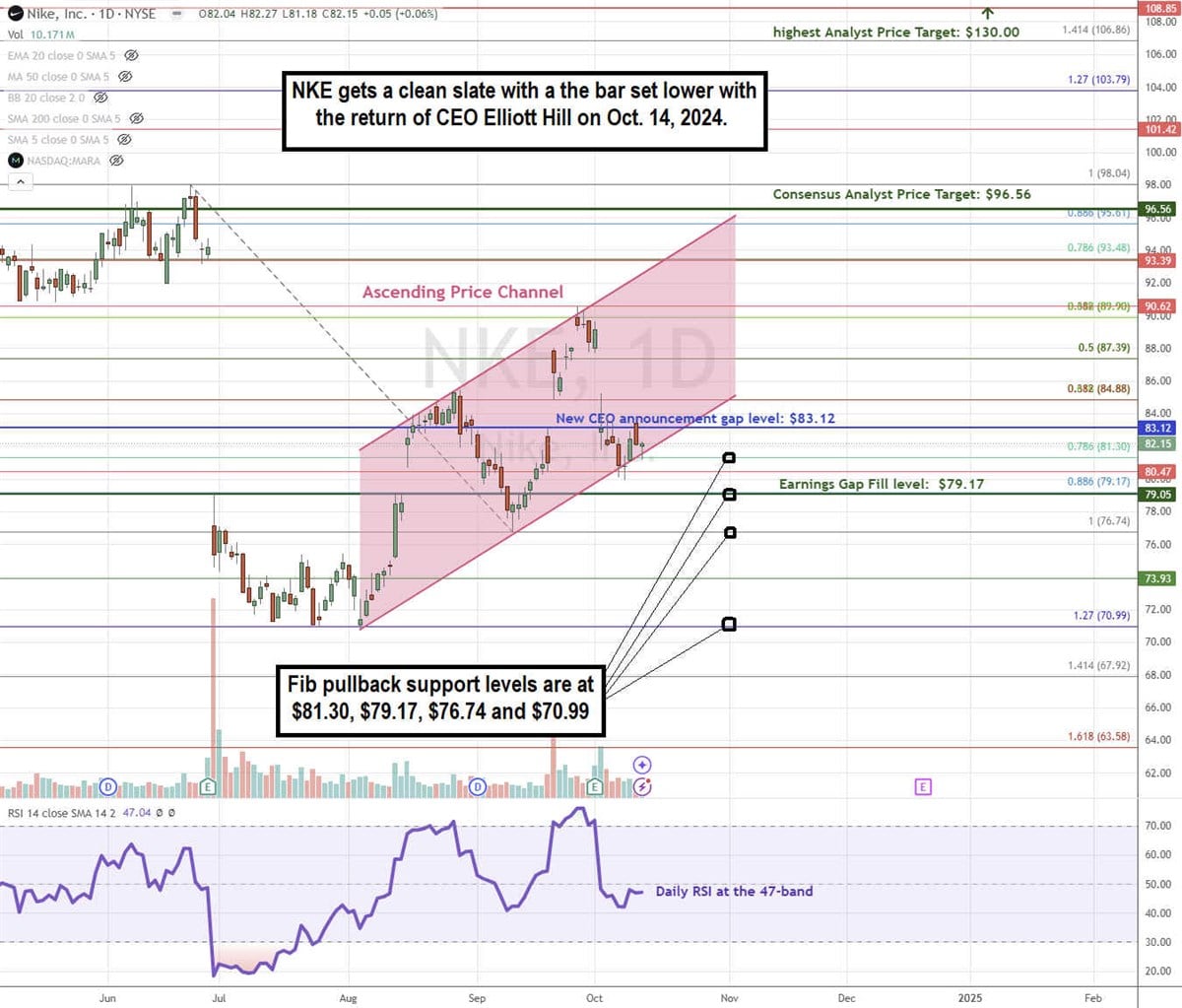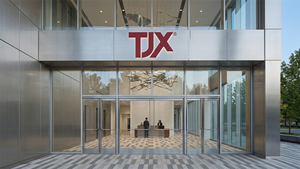
The former CEO of athletic apparel and footwear giant Nike Inc. (NYSE: NKE) returns on Oct. 14, 2024, ushering in a possible clean slate for the company’s operating woes. Nike has suffered declining sales as competitors in the consumer discretionary sector, like On Holding AG (NYSE: ONON) and Skechers U.S.A. Inc. (NYSE: SKX), had positive sales growth in recent quarters.
News of former Nike CEO Elliott Hill's return, announced on Sept. 19, 2024, surged the stock 12.6% in the following days, peaking at $90.62 before falling back down to the $80.47 pre-announcement level. The reversal was largely due to the weak fiscal first quarter of 2025 earnings report and lowered guidance, which paints a long road toward recovery for the new CEO.
Revenue Continues to Decline During the Transition
Nike reported a double-digit YoY revenue drop of 10.4% to $11.59 billion, missing consensus analyst estimates for $11.64 billion. Despite reporting a net income of $1.1 billion, down 28% YoY or EPS of 70 cents, beating consensus estimates by 18 cents, the sales metrics were less impressive. Its core North American revenue fell 11% YoY to $4.83 billion. This was large compared to a 1% YoY drop in its previous quarter. Greater China's revenue dropped 3% in constant currency to $1.67 billion.
Flip Flopping With the Wholesale Channel Bites Nike Hard
The former CEO had put Nike on a course to boost its direct-to-consumer (DTC) channel and pull away from the wholesale channel to get higher margins. However, this backfired harshly in the quarter. Nike had alienated wholesalers and retail outlets like Footlocker Inc. (NYSE: FL), choosing to boost their DTC business while purposely thinning out the wholesale business in the previous quarter. During this period, many competitors swooped in to grab precious shelf space vacated by Nike. Nike eventually reversed course with wholesalers, but the damage was done, as illustrated by the 8% drop in Wholesale revenue to $6.4 billion.
One would think its DTC business would have at least benefitted, but to the contrary, NIKE Direct revenue, its DTC channel, dropped 13% YoY to $4.7 billion. NIKE Brand revenues fell 10% YoY to $11.1 billion. Converse revenue fell 15.1% YoY to $501 million.
A Few Positives During the Quarter
Nike actually beat EPS estimates for the fifth straight quarter, largely due to cost-cutting efforts. The standout positive metric was the 5% YoY drop in inventory to $8.5 billion, which helped boost gross margin by 120 bps to 45.4%. Lower warehousing, product, and logistics costs also contributed to lifting gross margins. Selling and administrative expenses also fell 2% to $4 billion.
Nike had $10.3 billion in cash and cash equivalents, up $1.5 billion from last year. Nike also pointed out some meaningful improvements in various segments, including men's soccer and fitness and men's and women's running shoes. The China stimulus plan could also help China's sales as consumer spending improves.
Nike Withdraws FY 2025 Guidance Sharply Cuts Q2 2025 Guidance Due to CEO Transition
Due to CEO Hill's return, Nike did the safe thing and preemptively withdrew fiscal 2025 guidance. For the record, its previous fiscal full year 2025 guidance called for revenue to fall in the mid-single-digit percentage range, with the first half of 2025 reporting a high-single-digit percentage drop.
Originally, Nike expected positive revenue growth in fiscal 2025, but that's been reversed. Gross margin was expected to expand 10 to 30 bps. Nike also postponed Investor Day. The company sees a slight improvement in the second half of 2025. For the fiscal second quarter of 2025, Nike expects revenue to drop 8% to 10% and gross margins to drop 150 bps YoY.
The Bar Purposely Gets Set Low
CEO Hill was largely responsible for growing the Air Jordan franchise during his original tenure at Nike. However, it appears the company has set the bar extra low by withdrawing its previous fiscal full-year guidance. Investors are hoping Hill's return will bolster employee morale and investor sentiment. Analysts also set the bar lower by revising fiscal 2025 EPS estimates down to $3.09 from $4.38 a year ago.
NKE Stock Forms an Ascending Triangle Pattern
An ascending price channel is comprised of ascending (rising) upper trendline resistance and ascending lower trendline support. A breakout forms when the stock surges through the upper trendline, and a breakdown occurs when the stock falls below the lower trendline support.

NKE stock rallied as high as $90.62 on the news of CEO Elliott Hill's return from retirement. However, shares collapsed on its fiscal first quarter of 2025 earnings report and lowered guidance. The CEO announcement produced a gap fill at $83.12, which was filled on the Q1 2025 earnings drop. The $79.17 is a previous earnings lower gap fill price level that continues to hold support. The rising channel can continue if shares can rise back above the $83.12 gap-fill level. However, a breakdown under the $79.17 lower gap fill could trigger a new breakdown. The daily RSI is flat at the 47-band. Fibonacci (Fib) pullback support levels are at $81.30, $79.17, $76.74, and $70.99.
Nike’s average consensus price target is $96.56, and its highest analyst price target sits at $130.00. It has 16 analysts' Buy ratings and 13 Hold ratings. The stock trades at 2.5X sales.
Actionable Options Strategies: Bullish investors can consider using cash-secured puts to buy NKE at the Fib pullback support levels for entry and write covered calls to execute a wheel strategy for income in addition to the 1.88% annual dividend yield.




